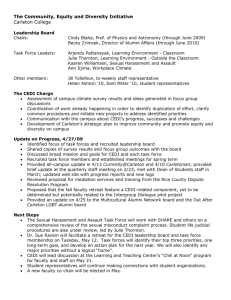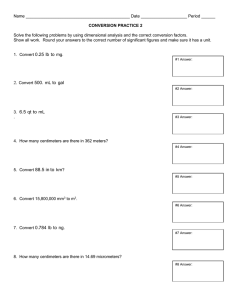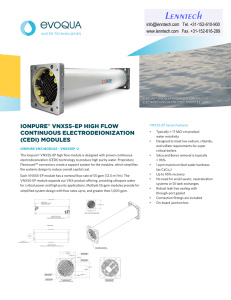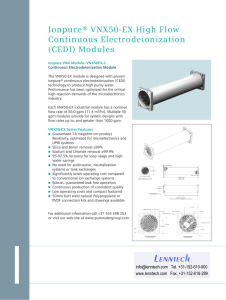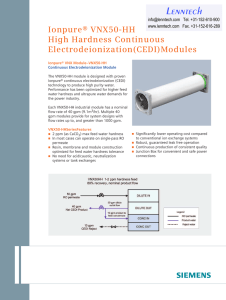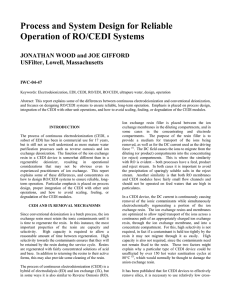Pharmaceutical Water System Operating Cost Optimization Presented by: Jeff Okun
advertisement
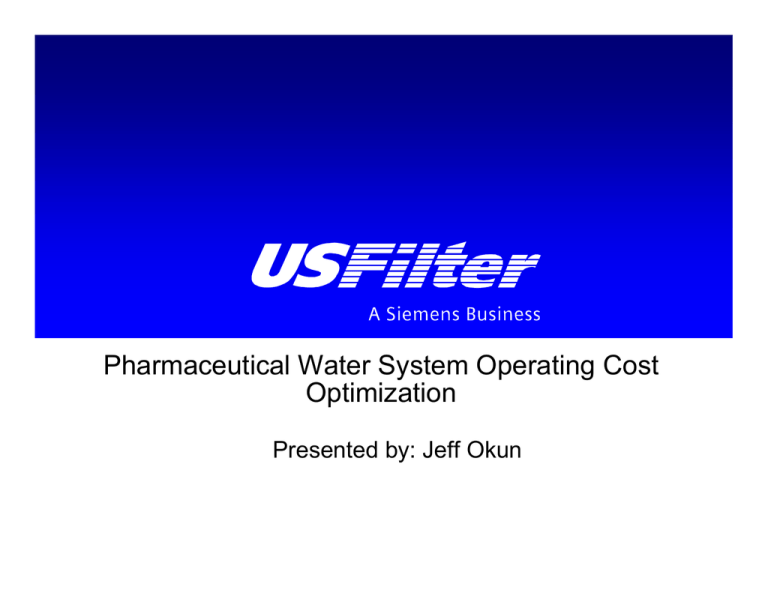
Pharmaceutical Water System Operating Cost Optimization Presented by: Jeff Okun There are many ways to design a water system… 2 History of USP Purified Water Design Equipment cost was primary consideration Utility costs were not seriously considered Bacteria control was primary factor in the design Continuous water recirculation was utilized Not many changes over the last 15 years Hot water RO/CEDI was last significant change (Better membranes, CEDI modules, instrumentation and controls). 3 Water and Sewer Rates Water and Sewer Cambridge, MA…………………$15.00 per 1000 gal. Puerto Rico………………..…….$41.00 per 1000 gal. Canton, MA………………………$10.50 per 1000 gal. Swiftwater, PA…………………..$31.00 per 1000 gal. Seattle, Wa………………………$10.00 per 1000 gal 4 Electricity Rates New England Mid Atlantic South East Southern California $0.09 to 0.14 /KWH $0.06 to 0.09 /KWH $0.05 to 0.09 / KWH $0.04 to 0.15 / KWH Seattle $0.05 to 0.06 / KWH 5 Cost of Steam The current price for natural gas is $12.80 per 1,000 cubic feet. It was as high as $14.50. A 1,000 cubic feet of natural gas can generate 1,011,569 BTU. A gallon of heating oil generates 138,890 BTU. A barrel of oil contains 42 gallons. The price of a barrel of oil today is $59.75. It was as high as $70.25. It takes 7.2 gallon of oil to generate a million BTU. The minimal cost of a 1,000 pounds of steam is $14 (using either oil or natural gas). 6 Pharmaceutical Water System Optimization Reduce water and power consumption Reduce or eliminate backwashing Reduce rinse water Increase RO water recovery Eliminate unnecessary recirculation and waste water Eliminate unnecessary unit processes Ultraviolet light Submicron filters Reduce installation costs Reduce validation costs Reduce space requirements 7 Process flow diagram 8 What design changes are necessary? Modify Pretreatment operation Increase RO recoveries 9 Pretreatment - Multimedia Conserve water Multimedia Options Replace with disposable filter cartridges Backwash on differential pressure or extended time (3 months est.) Eliminate process – over used on many feed waters Can reduce equipment cost 10 Multimedia Depth Filtration Anthracite Sand Fine Garnet Coarse Garnet Medium Gravel Coarse Gravel 11 Feed Particles Trapped in Sand Multimedia Filter in Operation Gravel Bed Filtrate 12 Case study 36” diameter unit Weekly backwash and rinse $15/1000 gallons + 10% annual increase $26,538 savings for 10 years (quarterly backwash) Additional long-term saving in maintenance cost Operating costs over 10 years are more than the cost of equipment 13 Activated Carbon Hot water sanitizable Cleaner non- backwashable type design No waste water Waste water equivalent to sulfite injection Utilize offsite preconditioned carbon Similar water savings as with the multimedia filters 10 year operating utility savings will exceed the equipment price Softener water savings can be similar 14 15 16 Reverse osmosis unit High recovery built into unit for recoveries up to 90% Cost savings example Start/stop operation 10 gpm RO at 75% recovery versus 90% 12 hour per day operation – 5 days per week 415,500 gallon per year savings $6,225 first year savings $99,227 over 10 years 17 Staging 75 gpm product 33 gpm product 100 gpm feed 22.5 gpm product 67 gpm reject / feed 19.5 gpm product 44.5 gpm reject / feed Three Stage 3x2x1-3 25 gpm reject 18 Reverse Osmosis / CEDI Start/Stop/Sanitize Operation No continuous recirculation Rapid hot water sanitization prior to start Capability for extended hot water sanitization if desired Robust CEDI design is required for pulsed heat Capability to recirculate the CEDI waste back to the feed of the system without a break tank 19 Process flow description The Activated Carbon, RO and CEDI are heated up quickly prior to filling USP Storage tank Heating sources In-line heat exchanger Hot Purified Water storage Stored hot water 20 Advantages of frequent pulse sanitizations Never have time to develop a biofilm on surfaces 21 Advantages of frequent pulse sanitizations System is sanitized prior to filling storage tank Low bacteria every time you feed the RO/CEDI Better control over activated carbon filters No polish necessary downstream Ultraviolet lights Submicron (0.2µ) filters 22 Hot water sanitization data Microbial type (cfu/mL) Fungi 500,000 Yeast 3,800,000 Cocci 2,400,000 Pseudomonas 2,600,000 Entero bacteria 2,600,000 Results (cfu/mL) 0 after 15 minutes at 65OC 0 after 15 minutes at 60OC 0 after 15 minutes at 60OC 0 after 15 minutes at 55OC 0 after 15 minutes at 60OC All these bacteria levels are 4 to 5 log higher than most water systems 1- 2 hours at 80 C is a conservative approach to sanitize systems 23 Process flow diagram - previous 24 Process description Simplified system design Break tank is not required to recovery RO or CEDI water during recirculation Ultraviolet units are eliminated because system is sanitized prior to each start Eliminate post CEDI submicron final filter for bacteria control Rationale – WFI loops (intermittent hot) never have submicron filters 25 Process diagram – New Optimization Revolutionary Design : Reverse Osmosis / Continuous Deionization (RO/CEDI) Multi-media Filter Dual Softeners Heat Exchanger A Hot Water Sanitizable Activated Carbon Unit to storage and distribution A 5 Micron Prefilter Hot Water CDI LX Unit Sanitizable Reverse Osmosis Unit 26 Case Study 1 – small system Typical single train of continuous recirculation, hot water sanitizable RO/CEDI system Water and waste water cost - $15/1000 gallons Electricity - $0.12 per KWH Steam - $33/1000 lbs. RO/CEDI 10 gpm product Operation (make up to storage tank) 12 hours per day 5 days per week 250 days per year 27 Operating cost reduction Water savings per year (start/stop versus recirculation) 1,219,940 gal/year Subtract Pulse heat (54,750 gallons per year) Net savings: 1,1653,390 gal/year $18,299 per year savings $821 cost per year for up to 4 times per day pulse heat Total $17,474 per year $283,709 over 10 years Assumes costs increase 10%/year 28 Operating cost reduction Steam savings $8,353 for feed water per year Assumes temper water to 77 °F $825 for pulse heating $7,528 per year $121,953 for 10 years per year 29 Operating savings continued: Power savings 5,640 hours operation per year (8,760 hours in a year) 10.5 KWH per hour $7,106 per year $115,117 per 10 years 30 Operating savings continued: Consumables Prefilters - $0.60 per 1000 gal. of waste water 1,110,440 gal./year water savings $666 per year $10,789 over 10 years Salt $0.88 per 1000 gal. $977 per year $15,830 per 10 years 31 Summary Case 1 Yearly Savings Water and waste water Steam Electricity Consumables $17,474 $ 7,528 $ 7,106 $ 1,643 TOTAL (Yearly)……………… $33,751 10 year TOTAL………….$546,766 Typical system price $300,000 32 Case Study 2 – large system Dual 80 gpm RO/CEDI trains with continuous recirculation 100% redundant system for Pharmaceutical manufacturing plant 12 hours per day operation 7 days per week operation 350 days per year Same utility cost as Case Study 1 33 Case 2 Water savings per year (start/stop versus recirculation) 23,711,040 gal/year $355,665 per year savings Subtract Pulse heat (876,000 gallons per year) $13,140 per year for up to 4 times per day pulse heat Total $345,525 per year $5,548,905 per 10 years 34 Case 2 Steam savings $ 513,555 for feed water per year (20° F delta T) $ 33,712 for pulse heating per year $ 479,843 per year $ 7,773,457 for 10 years 35 Case 2 Power savings 13,320 hours operation per year 112 KWH per hour $ 179,020 per year $2,900,136 per 10 years 36 Case 2 Consumables Prefilters - $0.60 per 1000 gal. of waste water 22,835,040 gal./year water savings $13,700 per year $221,940over 10 years Salt $0.88 per 1000 gal. $ 20,095 per year $ 325,536 per 10 years 37 Case 2 Yearly Savings Water and waste water Steam Electricity Consumables TOTAL (Yearly)……….$1,037,583 $ 345,525 $ 479,843 $ 179,020 $ 33,195 10 year TOTAL…….$16,808,845 Typical system price $1,500,000 38 Summary Every project should evaluate operating costs Operating costs may far exceed capital costs New system design can reduce both operating and capital costs Water and energy are not unlimited resources and conservation is a common goal 39 Questions???....Thank You JEFFREY M. OKUN DIRECTOR SALES AND MARKETING BioPharm WATER & WASTEWATER GROUP 10 TECHNOLOGY DRIVE LOWELL, MA 01851 TELEPHONE: 978-470-1179 CELL PHONE: 978-764-7635 FACSIMILE: 978-453-5821 EMAIL: okunj@usfilter.com www.usfilter.com 40
